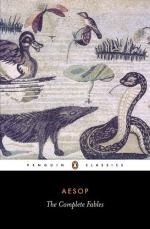THE ASS AND THE DOG
An Ass and a Dog were on their travels together, and, as they went along, they found a sealed packet lying on the ground. The Ass picked it up, broke the seal, and found it contained some writing, which he proceeded to read out aloud to the Dog. As he read on it turned out to be all about grass and barley and hay—in short, all the kinds of fodder that Asses are fond of. The Dog was a good deal bored with listening to all this, till at last his impatience got the better of him, and he cried, “Just skip a few pages, friend, and see if there isn’t something about meat and bones.” The Ass glanced all through the packet, but found nothing of the sort, and said so. Then the Dog said in disgust, “Oh, throw it away, do: what’s the good of a thing like that?”
THE ASS CARRYING THE IMAGE
A certain man put an Image on the back of his Ass to take it to one of the temples of the town. As they went along the road all the people they met uncovered and bowed their heads out of reverence for the Image; but the Ass thought they were doing it out of respect for himself, and began to give himself airs accordingly. At last he became so conceited that he imagined he could do as he liked, and, by way of protest against the load he was carrying, he came to a full stop and flatly declined to proceed any further. His driver, finding him so obstinate, hit him hard and long with his stick, saying the while, “Oh, you dunder-headed idiot, do you suppose it’s come to this, that men pay worship to an Ass?”
Rude shocks await those who
take to themselves the credit that is
due to others.
THE ATHENIAN AND THE THEBAN
An Athenian and a Theban were on the road together, and passed the time in conversation, as is the way of travellers. After discussing a variety of subjects they began to talk about heroes, a topic that tends to be more fertile than edifying. Each of them was lavish in his praises of the heroes of his own city, until eventually the Theban asserted that Hercules was the greatest hero who had ever lived on earth, and now occupied a foremost place among the gods; while the Athenian insisted that Theseus was far superior, for his fortune had been in every way supremely blessed, whereas Hercules had at one time been forced to act as a servant. And he gained his point, for he was a very glib fellow, like all Athenians; so that the Theban, who was no match for him in talking, cried at last in some disgust, “All right, have your way; I only hope that, when our heroes are angry with us, Athens may suffer from the anger of Hercules, and Thebes only from that of Theseus.”
THE GOATHERD AND THE GOAT
A Goatherd was one day gathering his flock to return to the fold, when one of his goats strayed and refused to join the rest. He tried for a long time to get her to return by calling and whistling to her, but the Goat took no notice of him at all; so at last he threw a stone at her and broke one of her horns. In dismay, he begged her not to tell his master: but she replied, “You silly fellow, my horn would cry aloud even if I held my tongue.”




